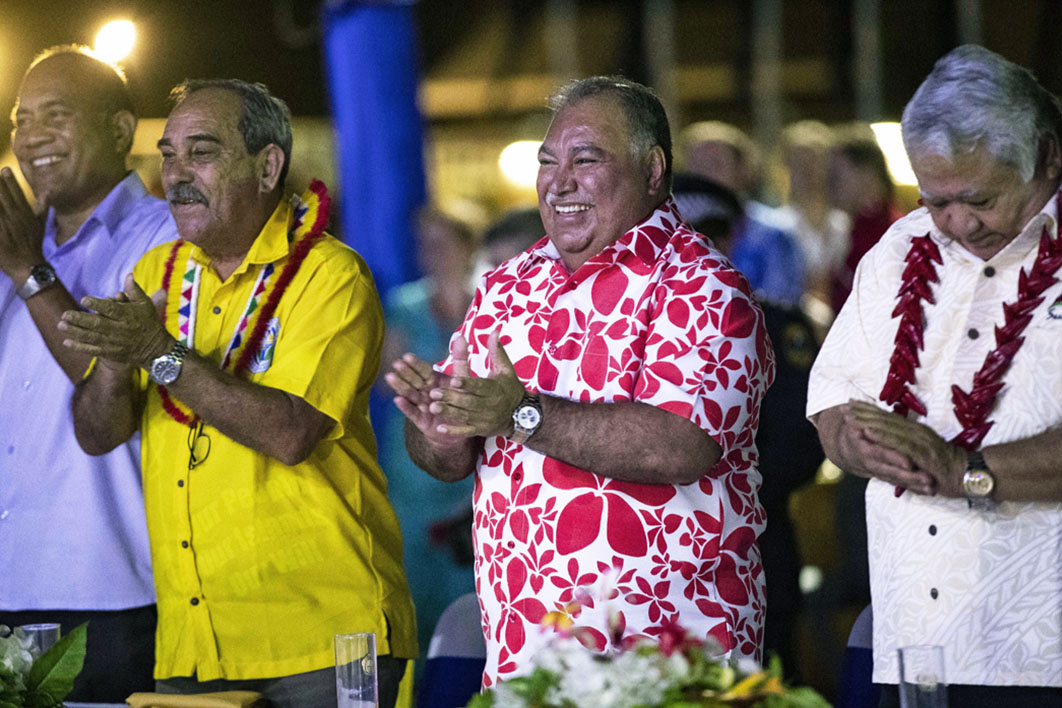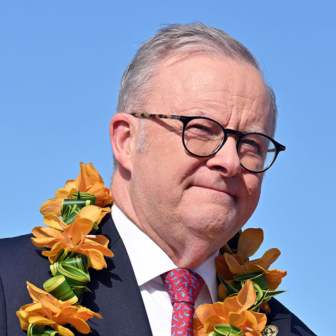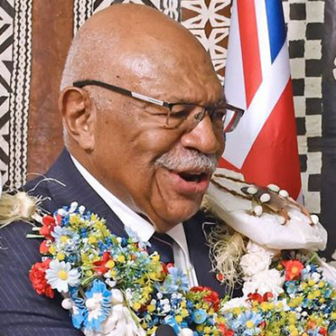The young Iraqi woman was clear. I had asked her if she wanted to move from Nauru to another country with her son under a refugee resettlement program. “Any country is no problem,” she said. “Some nationality good. New Zealand is a good option. Please, this island makes us crazy.”
“Her family is in Iraq but she been here for more than five years,” a family friend told me. “She is sick on medical and no help from hospital. They give her tablets but these make her crazy. If she raises voice at hospital, no one help us. Always cry, no one help her. No one help us.”
As a correspondent for Islands Business magazine, I’m a regular reporter at the annual leaders meeting of the Pacific Islands Forum. This year, though, I hadn’t been confident that I’d be given accreditation for the regional summit. I’m a longstanding critic of Australia’s multibillion-dollar offshore processing regime, and host nation Nauru has long been sensitive to criticism of its support for Australia’s refugee policy.
As of May 2018, 821 recognised refugees were living on Nauru, including more than 110 children, alongside asylum seekers who have been refused refugee status. Since it got under way in 2001 — with a hiatus during the first government of Kevin Rudd — the offshore detention program has cost Australian taxpayers billions of dollars. The beneficiaries have been corporations like Broadspectrum, Wilson Security, IHMS and Canstruct. The toll on the asylum seekers has been immeasurable.
But the program has also left hidden scars on the communities that host the refugees. “I was a child when the asylum seekers came,” one young Nauruan man told me during the Forum. “I was really pleased. I thought I could learn something about another culture. Now, I hate them. They are always attacking my country, criticising my leaders. I wish they would leave.”
Successive Australian and Nauruan governments have responded to criticism of indefinite mandatory detention by taking aim at the messenger and withholding vital information. When he was immigration minister, Scott Morrison was notorious for his lack of transparency, refusing to comment about “on-water” matters as he implemented the Abbott government’s policy of “stopping the boats.”
Nauru’s president Baron Waqa has argued that media organisations, human rights groups and UN agencies have relied on second-hand “fake news” about his country. But the Nauru government itself has limited the capacity of journalists to travel to the island for first-hand reporting. Nauru requires journalists to pay a US$5000 visa application fee, non-refundable if the request is refused — a significant disincentive for anyone wanting to look beyond government spin.
In line with standard practice for the regional summit, Nauru waived visa fees for accredited journalists at this year’s Forum leaders meeting. But it limited the number who could attend and introduced unprecedented restrictions on the stories they could cover outside the formal Forum agenda. The government attributed the rules to the complex logistics of hosting a large number of delegates in a small island nation, but it’s well known that President Waqa and his justice minister, David Adeang, have been angered by foreign media reporting of their alleged corruption. Their dislike of Australia’s national broadcaster, banned from the meeting, seems particularly intense.
That ban was also a significant blow for broadcasters from the islands region, which often relay news from Radio Australia and Radio New Zealand rather than send one of their own journalists to regional meetings. (My small gesture of solidarity was to comment from Nauru for ABC current affairs, Radio Australia and Radio New Zealand.) Other Australian media that critically report on refugees, local corruption or domestic opposition to the Waqa government, including the Guardian and SBS, also applied for accreditation but didn’t make the cut.
The Forum media contingent thus included reporters from the Murdoch press (the Telegraph and the Australian) alongside a larger New Zealand press pack. They were joined by a small team of Pacific journalists coordinated by the Pacific Islands News Association, from island nations including Fiji, Kiribati, Tuvalu, Samoa, Papua New Guinea and the Cook Islands, together with a few media from Tahiti, Japan and Finland.
Speaking to Pacific journalists before the Forum, Nauru’s health, education and land management minister, Charmaine Scotty, expressed frustration over “fake news” and the international reporting of the plight of asylum seekers on the island. For Scotty, the problem lies with the media rather than in government secrecy.
“If media is going to be reliable and going to be printing the facts, we are happy for them to come to Nauru,” she said. “The reason we have put this new policy in is because of the fake news. Before Trump made fake news popular, Nauru experienced that. We already had fake news, so we understood what fake news was all about.”
Unfavourable overseas reporting risks making the Nauruan people afraid of the refugees, she went on. “All this hyped-up news about the refugees calling Nauru hell on earth and all these kind of things. Nobody wants their country to be called that in the international media. This was making the transition between the locals and the visitors very hard.”
The government issued media guidelines that went far beyond the normal practice for previous regional summits. The restrictions included the following:
You are only authorised to report on or take photos of the Pacific Islands Forum. Any other subjects must be approved by the Republic of Nauru.
You must not travel to or visit restricted areas, for the safety and security of residents.
No photo or video may be taken on Nauru of any resident on Nauru who is an asylum seeker to protect their personal safety…
Refrain from interviewing Canstruct and other contractor staff as they have signed confidentiality agreements.
In true Pacific manner — on the principle that it is better to ask for forgiveness than permission — most journalists attending the Forum worked around these “guidelines.”
Meanwhile, Nauru’s chief spin doctor, Lyall Mercer, was introducing the Murdoch press to refugees, resulting in a front-page story in the Australian, complete with full-face photo of mother and child. Other journalists, such as a team from Tahiti’s TNTV, ventured into the camps to produce compelling interviews with distressed refugees.
Deriding the image of refugees living behind barbed wire, President Waqa was eager to stress that they were “living and working happily amongst the community.” During the day, it was possible to meet refugees in the streets, and I had a number of intense discussions arising from casual meetings.
But Nauru police had obviously been warned to monitor the conduct of journalists, all of whom sported a bright yellow badge and lanyard. After TVNZ journalist Barbara Dreaver was spotted talking to a refugee outside a restaurant, she was detained by police. Her phone and camera were taken for three or four hours, with technicians brought in to search for compromising material. On her release, her accreditation was briefly withdrawn, though it was later returned after negotiations.
As I was taking photos in the island’s Yaren district, I was approached by a young Iranian man. The twenty-six-year-old, who has been living on the island for five years, was eager to show me his workplace. “I didn’t want to just sit in the camp,” he said. “I need to do something, so I got a job. I like my boss from Nauru. I don’t want to end up crazy like the others.”
At this point, he made a maniacal face, distorting his features and holding up both hands with claw-like clenched fingers. His cartoonish gesture reminded me of the famous Diane Arbus photo “Child with Toy Hand Grenade in Central Park.” Unlike many refugees I met, he seemed resigned to the lengthy process that might lead to resettlement: “Some people go to America but Donald Trump doesn’t like Iran, so I cannot go.”
“Would you like to stay in Nauru?” I asked.
“Of course not!” he replied, in a tone that suggested I was mad. “Australia, good. New Zealand, good. Anywhere, good. I would like to go somewhere where I can meet a girl. Here, if we go with a girl, the Nauruans hit us.”
Management of the overseas media has become a preoccupation for some Pacific island governments. They are turning to public relations companies and spin doctors to promote their views.
Health minister Charmaine Scotty acknowledged that her government found it hard to respond to media queries. “Because of all the media coming in, it’s like a tidal wave that just drops and washes over you. So we’ve needed to get our act together and be more resilient and proactive in this area.” That’s why the government has contracted a PR agency to work with it, she said. “It’s helping teach our people in the media for them to be able to respond quickly to things and not take things at island time.”
Nauru uses the Brisbane-based public relations company Mercer PR. Founded by former journalist Lyall Mercer, who was omnipresent at the Forum, the company’s clients have included the Hillsong Church and the Queensland Liberal National Party. According to the company’s website, it assists clients “to manage their public messages, achieve real outcomes and develop proactive media strategies. We also assist our clients to minimise adverse publicity.”
On this last criterion, the Nauru government should be asking for its money back. Through Mercer PR, it has long disputed reports of refugees in distress and incidents of self-harm, rape or attempted suicide. Just before the Forum, President Waqa angered human rights groups by claiming that children were being “pushed” into self-harm by their families and refugee advocates. “It’s the way of working the system,” he said, “probably short-circuiting it, just to get to Australia.”
Such claims were dismissed out of hand by the refugees I spoke to, with one Somali man stating angrily, “Children growing crazy. They tried to suicide. No future.”
Facing obstruction on the broader issue of resettlement, international human rights groups have ramped up pressure in relation to children. The Refugee Council of Australia has launched a Kids off Nauru campaign, prioritising the relocation of vulnerable children as a first step.
According to a report released by the council during the Forum leaders’ meeting, “Australia’s policy has traumatised children so much that they are giving up eating and trying to kill themselves. Australian courts are increasingly forced to step in so that people can get the medical treatment they urgently need, as the Australian government repeatedly ignores doctors’ advice and does everything it can to avoid people being transferred to Australia, including sending them to Taiwan and Papua New Guinea.”
Refugee advocates are encouraging Nauru and Australia to take up New Zealand’s offer of 150 places for resettlement, but both governments are reluctant to budge, partly to avoid derailing the current US resettlement initiative.
“If Australia refuses to change course, it must not stand in the way of others who are willing to offer these people the protection they so desperately need,” says Amnesty International’s Pacific representative, Roshika Deo. “New Zealand’s prime minister this week reaffirmed a longstanding offer to take in 150 refugees per year from Manus Island and Nauru — Australia must facilitate, and not obstruct, this process.”
Pressure like this has not swayed the Australian government or its Nauruan counterpart. As she talked to journalists, Charmaine Scotty shifted blame towards the families of distressed children: “This child abuse that is happening — where are the parents? What is happening to the care of the children?” She called for UN agencies to upgrade their presence beyond a joint, locally staffed office in order to obtain accurate information on the ground.
Pacific governments have legitimate criticisms of some overseas journalists, who parachute into regional meetings without knowing the local agenda. It is a constant complaint in the islands that Australian and New Zealand media organisations do not invest in the region. Most media groups don’t allocate the travel budgets (let alone fund the overseas bureaus) that could benefit domestic audiences as well as the wider islands region.
But Waqa’s denial of the problems has been undercut by reality. As was highlighted by the release of notes kept by Roman Quaedvlieg, the former head of the Australian Border Force, Australian officials often despair at the challenges of operating in Nauru. Quaedvlieg’s notes from 2015 were released in the Australian parliament while the Forum was meeting, during the bitter battle with his former boss, home affairs minister Peter Dutton. The former Border Force head describes a case of self-immolation on Nauru, crumbling medical infrastructure and lack of staff training at the processing centre. (He recalls asking a young Nauruan liaison officer about drugs in the camp, at which point the man “asked me what I wanted and how much.”)
Quaedvlieg’s somewhat patronising take on Nauru masks the larger problem: the original sin lies in Canberra, not Yaren. Five years ago, reporting on Australian policy in Nauru, I wrote that “the legitimate focus on the plight of refugees on Nauru has overshadowed the impact Australian policies have had on the host nation, a closely integrated society of just 11,000 people.”
When I talked to Nauruan officials during this month’s Forum, the pressures on the economy, environment and livelihoods of Nauruan citizens are all the more apparent. While these officials seek to deal with the challenges, the presence of hundreds of asylum seekers and refugees in Nauru is placing an extra burden on the island’s water, energy and food security.
Berilyn Jeremiah, Nauru’s commerce, industry and environment secretary, said that climate variability and natural disasters are already affecting the country. “Nauru is susceptible to droughts which, in the past, have had significant impacts on health, food security and the economy, as it can put a strain on our national budget,” she said. “Drought periods can also increase the risk of fires, and for a country that is very remote, losing critical infrastructure and services such as power, water, schools and hospitals can be disastrous.”
Improved water security is vital, she said. “Food insecurity is also a major risk for Nauru, given our dependence on imported foods and our geographical isolation. Most agricultural activity is carried out by individual households and is constrained by limited availability of suitable land and water.”
Nauru has developed a twenty-year master plan for water security but lacks the resources to implement it. The environment department is seeking to increase the number of desalination plants, but they are costly to run and difficult to maintain. In the meantime, water tankers carry water to local communities on a regular schedule.
A heavy reliance on imported fossil fuels means that the cost of power generation in Nauru is also very high. Only 3 per cent of Nauru’s electricity is provided by renewable energy — a very modest share compared to other small island states in the region. An ambitious Nauru Energy Road Map seeks to increase renewable sources to 50 per cent by 2020.
Nauru also has some of the poorest health indicators for non-communicable diseases in the Pacific islands. A decade ago, according to the country’s new strategy to tackle the health crisis, it ranked second to Afghanistan in the age-standardised mortality rate for these diseases.
Dr John Auto, a Solomon Islander who coordinates public health programs for Nauru’s health ministry, declined to talk about refugee health but described the many programs the government is mounting to address obesity, diabetes and a junk food epidemic. Nutrition is a central element of the country’s current action plan on non-communicable diseases.
Recent surveys have highlighted the difficulty of growing fruit and vegetables, and the high cost of importing nutritious, fresh food aboard Nauru Airlines planes. “We have WHO standards like ‘are there servings of fruit and vegetable in the diet?’” Auto said. “But 95 per cent of Nauruans in that survey reported not having the recommended amount of vegetables and fruits.”
Nauru certainly needs resources to respond to these challenges. Beyond targeted aid and money channelled through Australian corporations like Canstruct, the Nauru government raises significant revenue by charging Australian taxpayers a monthly visa fee for hosting the refugees and asylum seekers. But these financial benefits — worth millions of dollars — must be balanced against the structural damage to Nauru’s economy and society as the refugee regime drags on.
We’ve seen this all before. In 2001, when offshore processing was first established by the Howard government, Australia pledged that asylum seekers would be processed within six months or “as soon as reasonably possible.” These timelines were implausible then and remain implausible today.
When Labor prime minister Julia Gillard revived the Pacific solution in 2012, it was clearly foreseeable that the same script would play out. Most asylum seekers would quickly be granted refugee status, but third countries would be reluctant to take them for resettlement. Medical research has shown that people’s mental and physical health then deteriorates under indefinite mandatory detention, leading to psychological crises and self-harm.
Governments in Canberra have long hoped that a third country would rescue Australia from this brutal and futile policy, but options are limited. Third countries welcoming refugees want to take the best and the brightest, professional people with good skills and qualifications and young people with good prospects for education and a healthy life. As the numbers are whittled down, Nauru will be left with people who have been refused refugee status, have complex medical problems, are in divided families or have received adverse security rulings.
The Obama administration’s bilateral agreement to resettle up to 1250 refugees from Manus and Nauru was begrudgingly affirmed by Donald Trump in his notorious phone conversation with Malcolm Turnbull early last year (although a leaked transcript of their conversation revealed that President Trump was bemused as to why Australia would not take people who had been granted refugee status and security clearances).
US interior secretary Ryan Zinke, who led the American delegation to this year’s Forum dialogue in Nauru, confirmed that the Trump administration would continue taking refugees from Nauru and Manus Island, but stressed in no uncertain terms that this would be a lengthy process. “We honour our commitments,” he said, “but the [security] vetting process has been frustratingly slow, especially from countries with no database, where the records are unclear.”
As Malcolm Turnbull emphasised to President Trump during their phone call, the United States doesn’t have to take the full number of 1250 refugees: “Every individual is subject to your vetting. You can decide to take them or to not take them after vetting. You can decide to take 1000 or one hundred. It is entirely up to you. The obligation is to only go through the process.” Going through the process — or just going through the motions — will continue to distort the economy and social structure of Nauru.
As chief secretary of the government of former Nauruan president René Harris, Mathew Batsiua played a crucial role in establishing the offshore processing program in Nauru. Today, he is a leading opponent of the Waqa government. (Just days after we spoke, Batsiua’s lawyers won a permanent stay on serious criminal charges relating to a 2015 protest outside the Nauru parliament.)
As a former MP and justice minister, Batsiua continues to support the offshore processing program as a contribution to a regional solution to the international refugee crisis. But he now argues that the mismanagement of the program is causing long-term problems for Nauru’s economy.
“Nauru goes into these arrangements with the view that it’s a transit country, so everything is temporary,” Batsiua told me. “The quicker people move on, the better for them, the better for everybody. They can move on with their lives, because we are dealing with human beings. It’s something we’ll try to deal with as best we can.
“But I’m talking about Nauru’s ongoing viability as an economy. When the numbers dwindle, and they will, the government hasn’t paid any attention to our local industry. All the industries that were thriving when they took over — the rehab, the phosphate mining, the fisheries — they are all struggling. In the phosphate industry, the number of buyers has gone down, certainly the tonnage has gone right down, there’s a lack of capital equipment and they’ve had to retrench people.”
Batsiua believes that the government has overwhelmingly focused on the refugee processing centre and “gloried in the revenues derived from that, at the expense of investing in our permanent industries.”
But there’s one fundamental difference between Pacific solutions Mark I (2001–07) and Mark II (2012–ongoing), and that is the fact that Nauru signed the 1951 Refugee Convention in 2011. As a party to the convention, it is obliged to provide sanctuary for refugees, assist their wellbeing and not return them to unsafe countries. As the program winds down, the danger is that future governments in Canberra may justify walking away from the remaining complex cases because Nauru is a sovereign country with its own obligations under international law.
For the young Iraqi woman, the young Iranian man, the traumatised children and the other asylum seekers and refugees on the island, as well as the people of Nauru, this shameful business cannot end too quickly. After the looming Australian elections, will an incoming Labor government have the courage to develop new policies? •




